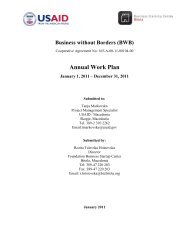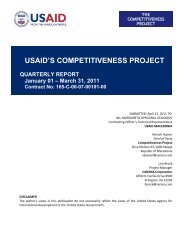FINAL REPORT - USAID Macedonia
FINAL REPORT - USAID Macedonia
FINAL REPORT - USAID Macedonia
Create successful ePaper yourself
Turn your PDF publications into a flip-book with our unique Google optimized e-Paper software.
Donor Coordination<br />
Whenever possible, MCP coordinated activities with donors operating with similar mandates. Without this type<br />
of collaboration, limited donor resources are wasted and opportunities are lost through duplication. MCP<br />
ensured intensive collaboration with GIZ, SIPPO and CBI in market linkage activities, and collaborated with the<br />
EU commission and Austrian Development Agency (ADA) and other activities. MCP partnered with <strong>USAID</strong>’s<br />
Ag-Biz Project in access to finance and helped generate opportunities in fruit exports, and with <strong>USAID</strong> BEA to<br />
reform internship legislation. The Project coordinated with a World Bank project to assist development of an<br />
export promotion strategy for Invest <strong>Macedonia</strong>. We estimate that collaboration leveraged at least $150,000 in<br />
project activities—particularly in market linkages.<br />
Learning Process<br />
As initiatives were piloted or rolled-out, MCP used project monitoring, engagement with the market,<br />
implementation partners and beneficiaries to identify changes in methodology or practice to improve<br />
effectiveness, scale-up results and achieve sustainability. The learning process also helped staff prioritize project<br />
investments, steering resources towards those initiatives with potential for high impact. For example, increased<br />
funds were allocated to the Financial Platform as the initiative gained traction and started to produce results.<br />
Later, as the model was proven in the market, MCP adjusted its compensation model to focus on priority sectors<br />
and types of investments, while reducing the amount paid. This contributed to scaled results, plus a more<br />
sustainable outcome, as cost-shares from beneficiaries increased.<br />
In some cases, this learning process meant MCP phased out activities that did not demonstrate beneficiary<br />
demand. For example, a pilot of the Marketing Platform, in which companies outsourced export marketing<br />
activities to a local marketing firm, achieved limited results. As a result, MCP chose not to extend the pilot.<br />
MCP partners also benefited from the learning process. By working closely with the Project, a variety of<br />
partners were able to internalize lessons to enhance their own capabilities and strategies beyond the scope of<br />
MCP. For example, the Textile Trade Association’s (TTA) work with MCP has helped it become more effective<br />
in matchmaking and facilitating relationships with European buyers. Financial service providers involved in the<br />
Financial Platform became more effective as a result of accumulated experience of working with multiple<br />
clients, as well as MCP-supported training programs (e.g. CMC, PMP). Financial institutions used engagement<br />
with the project and its financial facilitators to become more responsive to the needs of companies (e.g.<br />
<strong>Macedonia</strong>n Development Bank offering factoring as a new working capital solution). Educational institutions<br />
grew to value the role of internships and career development in preparing their students to join the workforce.<br />
MCP communicated the outcomes of its learning through public events (e.g. financial platform matchmaking,<br />
Workforce Development Working Group), newsletters and staff participation in the local media.<br />
13




